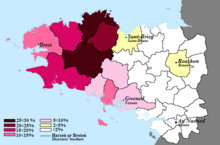Breton dialects
| Breton | |
|---|---|
| brezhoneg | |

|
|
| Pronunciation | [bʁeˈzõːnɛk], [brəhõˈnek] |
| Native to | France |
| Region | Brittany (including Loire-Atlantique) |
| Ethnicity | Bretons |
|
Native speakers
|
210,000 in Brittany (2007) 16,000 in Île-de-France (Number includes students in bilingual education) |
| Dialects |
Gwenedeg Kerneveg Leoneg Tregerieg |
| Latin script | |
| Official status | |
|
Recognised minority
language in |
No official status
|
| Regulated by | Ofis Publik ar Brezhoneg |
| Language codes | |
| ISO 639-1 | br |
| ISO 639-2 | bre |
| ISO 639-3 | Variously: |
xbm Middle Breton |
|
obt Old Breton |
|
| Glottolog | bret1244 |
| Linguasphere |
50-ABB-ba to -be)
|

Regional distribution of Breton speakers (2004)
|
|
50-ABB-b (varieties:
Breton (/ˈbrɛtən/; brezhoneg [bʁeˈzõːnɛk] (![]() listen) or [brəhõˈnek] in Morbihan) is a Southwestern Brittonic Celtic language spoken in Brittany.
listen) or [brəhõˈnek] in Morbihan) is a Southwestern Brittonic Celtic language spoken in Brittany.
Breton was brought from Great Britain to Armorica by migrating Britons during the Early Middle Ages; it is thus an Insular Celtic language, and as such not closely related to the Continental Celtic Gaulish language which had been spoken in pre-Roman Gaul. Breton is most closely related to Cornish, both being Southwestern Brittonic languages.Welsh and the extinct Cumbric are the more distantly related Western Brittonic languages.
...
Wikipedia
